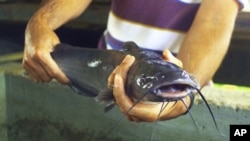U.S. Senate debate over a bill to facilitate approval of a mammoth, 12-nation Pacific Rim free trade pact was mired Tuesday in a squabble over catfish, a whiskered, fresh-water fish commercially farmed in the United States that faces competition from Asian imports of a similar species. The controversy illuminates domestic political hurdles for trade legislation, as lawmakers contend with a multitude of local interests affected by international competition.
The nations attempting to forge the Trans-Pacific Partnership account for trillions of dollars in collective annual trade. But negotiations are being hampered by a spat over the lowly catfish, a regional U.S. industry that accounts for less than a billion dollars in yearly production.
That spat spilled onto the Senate floor Tuesday, when Republican John McCain decried a measure that smells fishy (suspicious) to Vietnam and other TPP nations: enhanced U.S. government inspections of an Asian-produced catfish equivalent.
“The true purpose of the catfish program is to create a trade barrier to protect a small, handful of catfish farmers in two or three southern states – one of the most brazen and reckless protectionist programs that I have encountered in my time in the U.S. Senate," said McCain.
The 2008 U.S. farm bill mandated a new catfish inspection regime run by the Agriculture Department. All other seafood sold in America is tested by the Food and Drug Administration.
McCain says the program is hurting America’s larger economic interests.
“Ten Asian-Pacific nations have sent letters to the U.S. Trade Representative warning that this USDA catfish office is hurting TPP negotiations. At least one nation, Vietnam, has threatened trade retaliation," he said.
According to Republican Senator Roger Wicker, the real issue is not protectionism, it’s the health of American consumers. Wicker represents Mississippi, one of America’s biggest catfish producers.
“What this is about is food safety for Americans in 50 states who deserve to know that the fish they are eating is unadulterated," said Wicker.
Wicker says Asian-produced seafood has been found to have higher levels of chemicals and other contaminants.
“We’re talking about cancer! Many overseas productions are simply not operated under the sanitary conditions that we insist upon in the United States with our farm-raised catfish," he said.
Such animated Senate debate illustrates the challenge of finalizing a free trade pact among 12 nations – all with interests to promote and protect. Claude Barfield specializes in trade issues at the American Enterprise Institute.
“You’ve got 12 [TPP] nations – about a third of world trade. So it’s larger than the trilateral [negotiations] under NAFTA [North American Free Trade Agreement] under Clinton, or the 16-17 bilateral negotiations under [President George W.] Bush," said Barfield.
Barfield says the United States will win in some areas of trade negotiations and have to compromise in others, but should remain confident that the final TPP deal will benefit America in the long run.




